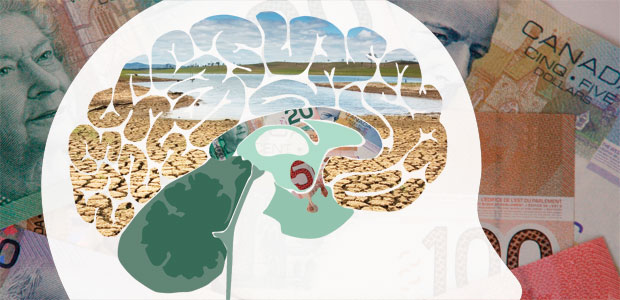Advertisement
If We’re So Smart
Why aren't we sustainable?

Humans have big brains. This is the biological basis for one of our species’ greatest conceits: that we are uniquely intelligent and self-aware.
On the surface, this belief seems well-founded–the largest part of the human brain is devoted to the neocortex, which is the locus of abstract thought and our capacity for reason, logic, and forward planning. Not surprisingly, it is also the seat of consciousness.
Brain Matter
Humans are aware of their own existence and have a sense of individual agency of free will. In this sense, we live in–and out of–our neocortex and tend to think of it as the command post of our being.
But this perception is part illusion. The neocortex is a relatively recent arrival on the human evolutionary scene. It sits astride the much older midbrain (limbic system) and the truly ancient reptilian brain stem, both of which still play significant roles in shaping who we are.
The midbrain is the source of complex human emotions that help to shape our most critical value judgements. The brain stem is more visceral still, governing instinctive social behaviours and other hard-wired behavioural predispositions (territoriality, social stature and dominance rituals, the fight-or-flight response). Neurologist Paul MacLean coined the term “triune brain” to describe this complex tripartite anatomy.
Of course, normal human behaviour emerges from the fully integrated brain. Our expressed personalities spring from a melding of conscious thought, felt emotions, and subliminal instinct. The critical point is that in different circumstances, any one of the sub-brains, with its distinctive motivations, capacities, and limitations, may plant itself in the captain’s chair. And the owner of the brain may not be aware of what part of the brain is actually in control.
No Brainer?
In this light, consider our global ecological crisis–climate change, eroded landscapes, the energy crunch, local food shortages, etc. As intelligent beings, we know that these trends are all symptoms of already excessive human demand on a finite planet. The thinking part of the brain knows that infinite growth on a finite planet is impossible.
Yet, against all reason and logic, we have created a global culture whose essential economic institutions, from the banking system to individual pension plans, depend utterly on perpetual material growth. Despite the cascade of evidence that humanity is on a collision course with reality, decision-makers everywhere therefore resist making the deep changes necessary to avoid catastrophe.
Wouldn’t an intelligence-dominated species at least pause to ask: “Given the finite productive capacity of the Earth, what is the optimal size of the economy?” and “How might we distribute the products of this optimal economy in such a way as to maximize human well-being and happiness?”
Emotion Over Reason
The problem is that intelligence is not the primary determinant of human socio-political behaviour. If the best of science challenges entrenched ideology, sacred beliefs, and the established social order, so much the worse for science.
“The masses have never thirsted after truth. They turn aside from evidence that is not to their taste, preferring to deify error, if error seduce them,” said noted French social psychologist Gustave Le Bon.
When social status, political power, or national prestige are at stake, emotions and survival instincts may well trump intelligent analysis. “The rise and fall of cultures…has always been primarily determined by the tides of human passion, not by the ebb and flow of reason,” wrote Reg Morrision in his 1999 book, The Spirit in the Gene (Cornell University Press).
It seems that in times of crisis (or even in defence of the status quo) the time-tested subliminal urgings of the midbrain and brain stem may override the reasoned deliberations of the neocortex.
All of which suggests that humanity’s unsustainable behaviour is partly rooted in basic human nature, a conclusion supported by recent findings in cognitive science. Researchers have identified a specific neural mechanism that further explains why it is so difficult for people to break from entrenched beliefs and behavioural patterns–but that’s another story.




